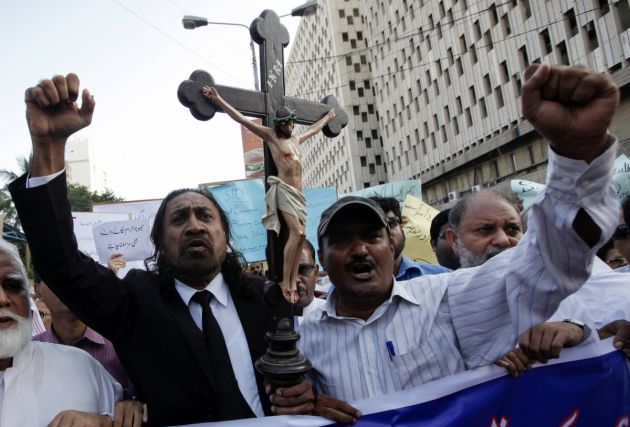Christians in Pakistan protest for an end to misuse of blasphemy laws

A peaceful protest was held in front of the Punjab Assembly in Lahore, the capital of Pakistan's Punjab province, calling for an end to the misuse of the Muslim-majority country's blasphemy laws.
They demanded justice for Nazir (Lazar) Masih. Nazir Masih, a Christian who was brutally lynched on May 25, 2024, by a mob in the name of Islam in Sargodha after being falsely accused of blasphemy, Pak Christian News reported on June 10.
The Human Friends Organization (HFO) organized the protest after the man was falsely accused of burning pages of the Quran, the Muslim holy book.
It brought together Civil Society Organizations (CSOs), including the Centre for Legal Aid Assistance and Settlement (CLAAS), Peoples Commission for Minorities Rights (PCMR), Christians True Spirit (CTS), and several other organizations and individuals.
Prominent religious leaders attended, including the Rev. Leo Roderick Paul, Bishop of the Multan Diocese, Rev. Majeed Abel, and Bishop Abraham Daniel from Sahiwal.
Notably said Pak Christian News, Muslim religious scholars Allama Asim Makhdoom, Prof. Mehmood Ghaznavi, Dr. Baddar Munir, and Allama Arif Chishti stood in solidarity with the Christian community.
The blasphemy laws were radically changed in the 1980s to impose life imprisonment for defiling a copy of the Qur'an and death for insulting or criticizing the prophet Muhammad.
In 1988, Bishop John Joseph of Faisalabad publicly committed suicide in protest against the law; and although no one has yet been executed, an estimated 1,200 to 4,000 blasphemy cases have been filed.
CASES INCREASED
The number of cases (against both Muslims and Christians) has increased in recent years, resulting in long prison terms, both on remand and under sentence, said the statement.
Cases are often brought to settle personal scores or target the vulnerable.
The June 10, protesters called for swift trials for those responsible for the Jaranwala and Sargodha tragedies and the formation of a judicial inquiry committee to investigate mob justice incidents from Shanti Nagar to Mujahid Colony Sargodha.
They also urged legislation to prevent the misuse of blasphemy laws.
Samson Salamat, Chairman of Rawadari Tehreek, advocated banning extremist religious groups involved in violence against minorities and called for criminalizing false blasphemy allegations.
Bishop Dr. Azad Marshall expressed deep sorrow over the violent deaths of Nazir Masih and others targeted by mob violence.
Sajid Christopher highlighted the ongoing persecution of religious minorities in Pakistan. "Nazir Masih's death is a stark reminder of the persecution faced by religious minorities. We must unite to demand justice and ensure such tragedies do not happen again," said Christopher.
Sharon Shamir, Coordinator of the Legal Department at HFO, emphasized the need for justice and protection for all religious minorities.
Peter Jacob, Chairperson of PCMR, called for a judicial inquiry commission to investigate blasphemy cases and urged upgrading police SOPs to effectively handle mob attacks. Asher Sarfraz and Katherine Sapna from Christians True Spirit (CTS) condemned Nazir Masih's lynching as a heinous act and demanded a fair trial.
Eiga Kenny from CLAAS called for a transparent investigation and compensation for the affected family.
Naumana Suleman, Founding Chairperson of Minority Women Forum (MWF), demanded justice and compensation for Nazir Masih's family. James Rehmat, Executive Director of the Ecumenical Commission for Human Development (ECHD), advocated for a special police force to protect places of worship and specialized training for police officers.
The protest lasted from 6 p.m. to 8 p.m., and participants included Christian lawyers, religious leaders, scholars, parliamentarians, community leaders, youth leaders, students, teachers, and journalists.
The CSOs urged the Punjab government to ensure justice for the perpetrators involved in the lynching of Nazir Masih through a transparent and independent investigation.